Catch-up: early 2017 I’d bought a boat in Martinique where I worked, left it in Guadeloupe for hurricane season with a friend, become trapped there without a working engine, had faced 2 major hurricanes, had floundered around needing help from everyone, and eventually escaped my marina prison to finally get to a place where I could haul her out and do the work I needed to get back to Martinique. After ill-advisedly recruiting my delivery crew using Tinder, a slightly traumatic passage had me arriving in my new home, living a new life of lying around on beaches, drinking rum and occasionally going to work. After a bit of a push, I finally got it together to start taking command of the Anne Bonny myself and made it across the channel to a whole new country: St Lucia.
May 2018
Time was marching on fast and before I knew it my second Language Assistant contract was up and I was forced to think about what I’d be doing with myself the next year when I got back from my summer in Europe. Apart from a few hours a week in a primary school and some private students, I didn’t have an official job, but it wasn’t like I could just leave now that I had my boat. Without much work on I was mostly kicking around the marina. I did some satisfying boat tasks (like reorganising my plumbing system and designing a swim platform for the stern), but I was starting to get frustrated by life on the dock. Stuck there, my boat wasn’t much more than a leaky apartment. I started to consider my cruising plans. It felt like I had an infinite amount of time and a growing list of places I wanted to visit.
We’d just been to Dominica (Grace, an Archaeologist and a couple of other friends), a year and a half on from the hurricane. I’d first been for the World Creole Music Festival when no-one knew Maria was coming, and now the difference was drastic. In its glory it had been an island full of high jungle-clad mountains tumbling straight down into the sea. Without many paradise beaches to speak of, this was an island for ecotourism, full of mystery and witchy herbs. Now it was still bare, people continuing to put their community back together. Some places still didn’t have electricity or water and half the island’s population had vanished to try their luck elsewhere. Grace commented that the acres of bare trees made it look like winter in Colorado. We lounged about in some hot springs and met a man who had just got his citizenship, preparing to fly back to wherever he came from. We congratulated him but his (butler? Pilot?) said he needed a second passport because of… we weren’t sure why but he made it sound like money-laundering purposes. He was a rich South African businessman, apparently. We chatted to him a little bit and played dumb – would he invest in his new place of citizenship? Obviously he saw what he’d paid for his passport as an investment of sorts, but who knew where that money really went. He looked shocked and said no. (Who would invest in this place? There was no business here, no chance of profits.) It was a clashing of very different worlds and he looked uncomfortable to be among the plebs soaking in the same bathwater. (We were there in a small group of locals and Caribbean tourists, including a Martiniquaise woman who was visiting an old American flame she knew there and who she hadn’t seen in over 20 years. I’ll get to her in a minute.) Dominica was one of those Caribbean islands that offered nothing like the beaches-and-cocktails life I’d encountered so far. I knew I wanted to go back and get to know it better.
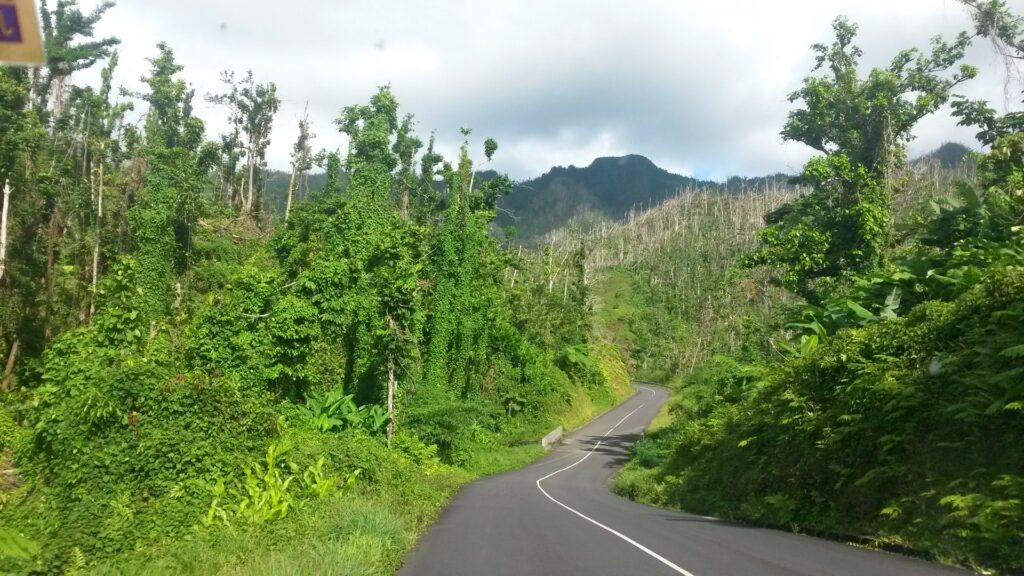
I also wanted to go south – the Grenadines of course, but could I maybe even get as far as Trinidad and Tobago? At the end of the day, however, my goal was to go to Antigua. Although it wasn’t the whole point of me being there in the first place, finding out about my family history there was a big factor. My first attempts to get there had already been thwarted, but now I was growing in confidence as a sailor, going there myself in my own boat was a real possibility. But once I made it, what would I do? What was I really looking for? What was my place as a white person in the Caribbean when it was universally accepted that my people had been unforgiveable arseholes (to put it mildly)? In the independent islands, white people were mainly there as tourists, and to look into your own history there meant confronting something much darker. One thing was sure, though: you would always be an outsider.
A Side-note on Outsiderness
In Martinique my outsiderness was OK, primarily because after 1 minute talking to me it was clear that I wasn’t French. Martinique has a complicated relationship with France – although its citizens benefit from a European passport (and therefore in a global context are significantly freer to travel than their independent neighbours) and the French social care system, many still feel like they’re a colony. They view the white French citizens who arrive to work or retire as nothing more than colonialists, exercising what they see as a dubious right to their island and expecting the same culture and attitudes of the motherland. (This of course isn’t true of many French who come to join the community, and the attitude isn’t universal among the locals, but there’s a marked hostility.) The Caribbean is an unusual region in that nearly all its inhabitants (aside from notable exceptions in islands like Dominica) don’t have ancestors who originated there. Everyone has been an immigrant at some point in their bloodline, whether that was voluntary or not. A white friend of mine had been born in Martinique and lived there all his life. He spoke Creole and as far as he was concerned, he was Martiniquais. But when he used Creole in a Facebook group to explain a time when he’d been assaulted in Fort-de-France, he was roundly abused and told to go back to Metropole (the word for European France according to the overseas territories). But he felt this wasn’t fair, Martinique was the cultural identity he had. There’s the clear attitude that if you’re white, you can’t be ‘from’ the Caribbean. Maybe they would have grudgingly accepted his localness if he’d been a Béké (the remnants of the old land- and slave-owning families), but he would have been hated for other reasons and certainly shouldn’t have been speaking Creole, which is seen as a solidarity language with its roots in fighting the oppression of slavery. Any time I’ve tried to learn Creole, however (as a foreigner), it’s seen as a sign of being interested and supportive of local culture and is met with positivity. As a non-French person spending four years resident on the island, I’ve found myself greeted with enthusiasm – clearly you’re here because you like us and respect our culture.
Our new Martiniquaise friend from the Dominica trip invited us round for lunch, and while she and I were waiting for the others to arrive, we made accras together and she gave me a bit of her own history. She’d been born in Martinique but her family had moved to Paris when she was one. She didn’t come back to settle until she was an adult. She told me about the social difficulties she’d had because of it. She was Antillaise, but not. She tried to speak Creole but couldn’t shake her Paris accent. After struggling with identity she decided to reject labels and consider herself a Citizen of the Earth. She talked about the slack work attitudes here, and the difference between the Metros who integrate and those who don’t bother. She said that because she has a Paris accent people treat her like she’s a snob. She also talked about continued tensions with the Metros, because of history that’s still with them and the fact they’re a Department. They’re still controlled by ‘over there’, even though they consider themselves Antillais and not French. Nothing is simple when you dig into the ideas of culture and belonging, not even for locals.
How this all led back into my own sense of identity related to Caribbean ancestry, I still wasn’t sure about. For the most part it seemed like something to keep quiet about. The white Caribbeans (the ones who had been there a while, not the more recent arrivals like my Creole-speaking friend’s family) were never viewed in a positive light. I mean, there can’t have been any of them whose family didn’t own slaves, right? The British and the French alike are profoundly ignorant of our countries’ roles in the transatlantic slave trade, and the extent that many families who never left the continent benefitted. And of course us (how many of us, exactly?) who still benefitted now, in privilege passed-down. This was a topic that would need further exploration with my trip to Antigua. But for now, I had a lot of work to do to even get there.
Back to the sailing bit
In the meantime, I noticed some new young people had arrived in the marina. This was quite exciting because the last time I’d been around people my age on boats had been in Guadeloupe. As I recounted in a previous post, I hadn’t had the best experience with them since it had all been rather cliquey. I wasn’t going to let history repeat itself, however, and since I could now actually speak French I decided to take the initiative. I went to make friends with them. They looked like the pirates (they even had a cat like the ones they most resembled), but they were an exact wholesome opposite (read – no drinking or drugs or casual illegal activities). They were a young couple who had recently bought their boat without any idea at all of how to sail it. The previous owner had helped them anchor in Anse Mitan round the corner, but it had swiftly transpired (when someone had had to rescue the boat as it drifted away) that the anchor was broken. They’d limped into the marina being told strictly that they could only have the berth a week and no more. There weren’t any more long-term places. Once there, they shrugged and said – you can’t throw us out, we don’t know how to get out and our engine is broken. Eventually the Capitainerie relented and let them keep the space more long-term, so here they were. He was a climbing instructor so I’ll call him Monsieur Escalade, and her I’ll call Jeanne de Clisson. The boat was Païe Olive, and the cat liked to bring home presents of small crabs instead of the usual tiny birds or mice. Things were still fresh and new between us at this point, but these two were to become a big part of my life as time wore on.
June 2018
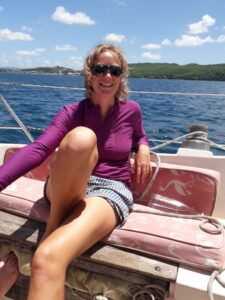
With my dreams of future voyaging and my preparation for that in mind, it was time to go sailing again. My brave crew for the day were the Fisherman and the Archaeologist. The Archaeologist was going to rent the bateau from me to live in while I was in Europe and I’d promised him a trip out. It was a calm lazy day without much wind, and I decided we would just get the genoa out since the wind was pretty much behind us and we weren’t tying to get anywhere quickly. Once we were set up and on course, I passed the helm to the Fisherman and headed down below to fill in the log book and get some tunes on. Out of the corner of my eye I caught a strange flash of light, and glancing down at the floor I noticed a reflection through the thumb-hole in one of the panels. Weird. Why was there water in the bilge? I’d cleaned it out quite recently. I lifted the panel and suddenly it was clear there wasn’t just a little bit of water – the level was climbing, and very quickly. Shit.
The engine was still running and I opened the compartment. Water was gushing in an aggressive fountain. I didn’t have time to investigate where from because – Goddamnit – we were sinking (or soon would be at any rate). I rummaged for the bilge pump, trying to stay calm (not very effectively). For the record, my bilge pump was a joke. I’d already been warned to install an automatic one but I hadn’t got round to it – it had felt like a big job full of plumbing and maybe extra holes in the hull. The one I had was quite small, a nice long hose protruding and a wire with an adapter on the end to allow it to plug into a 12v cigarette lighter socket. I set it up and plugged it in hurriedly. Nothing happened. The wires were corroded to buggery. Fuck. I called to the Fisherman weakly. Maintenant! I yelled when he didn’t immediately leap down the companionway. The Archaeologist now had the helm and this was his first time sailing. He peered down at us with concern while I told the Fisherman to bail into the sink. I popped my head into the cockpit to see how the Archaeologist was doing. He didn’t look happy. We’re sinking, I informed him. Do you think you could turn us around and head back to port? He tried but that caused chaos with the genoa. I wasn’t thinking through my processes carefully enough or giving clear instructions. I was letting my mounting panic get the better of me.
It’s fine, I tried to calm myself. It’s not like we’re in the open sea. It’s fifteen minutes back to the marina. I hauled in the genoa and the Archaeologist found a comfortable course back the way we came. Why didn’t I know how to use my manual pump? I’d never even tested it. I didn’t even know if it was connected to anything, or where the handle was. Skipper fail. I ducked back down below to check on the Fisherman. He’d stopped bailing and was now re-wiring the bilge pump. Clever boy. The water level was rising swiftly so I took over bailing and watched him anxiously. He had hold of the spare battery and was touching the ends of the wires to the terminals. Sparks. Then the pump whirred into life and started sputtering dirty oily water out of the hose and into the cockpit. The star! I high-fived him and headed back to the cockpit to help the Archaeologist. Now sinking seemed less imminent and drowning probably not on the cards, my mind meandered onto the expensive repairs that were coming my way before anything else in my life could happen. I got the fenders out and took the helm.
Manoeuvring back into my berth in a dangerously leaking vessel was very stressful, not least because the Archaeologist hadn’t done this before and floundered around without a clue what to do. Thank goodness for the Fisherman who had been on this ride before. Just because we were back in the berth didn’t mean this nightmare was over, however. Now the ingress of relatively clean seawater was replaced by disgusting polluted marina water (we all know everyone shits in there…). The pump was still working but we still hadn’t solved the problem.
With the engine off it was easier to see where the water was coming from – the rubber shaft seal connecting the propeller to the engine, and there was rather a large hole in it. My neighbours were out on another day trip and there wasn’t anyone else around. I called every boat person I knew to see if there was anyone in the area who could help, but there wasn’t. Eventually one of the Swedish Boat Mafia gave me some advice over the phone. Basically – use whatever you can and bung the hole. The pilot berth was emptied for better engine access, and we attacked the job with plastic bags, bit of string, rubber gloves and eventually mastic paste. Miraculously, the bilge finished draining and no more water was coming in. My shell-shocked crew fled and I was left to survey the mess and cry over the added stress and financial burden my life had now acquired.
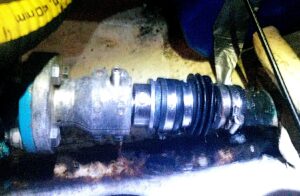
My neighbour arrived back at the end of the day and gave me a number for one of the handymen who I’d seen out and about in the marina. I sent him a text, joking that I was sinking, and he hot-footed it from the next bay. He gave me his best ‘rescuing a damsel in distress’ impression and diagnosed the problem down below. I needed a spare part and a diver, he told me. Luckily he was a diver and a sort-of mechanic. Just get the part and he’d do the work. Praise be. Also, the improvised plug was holding. The part proved to be very expensive and even moreso if I imported one to the island. Since I was leaving soon and we were no longer in any danger, this was going to have to wait until after I got back from my summer in Europe. I didn’t like leaving my boat with the engine immobilised – it gave me a horrible sense of déjà-vu. But I didn’t have a choice.
In the meantime, my new marina friends had introduced me properly to the marina’s grand motivator, Moustache (who’d been among the first people I’d met in Pointe du Bout the day I’d arrived with Tinder Guy, but who I hadn’t seen since). He’d been trying to persuade us to join the regatta he was organising and since my boat was now thankfully out of action (I didn’t fancy the stress of skippering a race), Jeanne invited me to be on her crew. M. Escalade was supposed to be working that day – so we could make a girl’s crew. She was even less confident than me with her boat, so she really wanted me to come. Somehow she saw me as the ‘real sailor’ of all of us young folks. Moustache took us out in his tiny racing boat for a preview of the course. It was one of these ones that didn’t have any auxiliary power at all and had you so close to the water you were practically bathing in it. This was way too much adrenalin for me and I wasn’t sure a regatta was going to be my thing. But Jeanne didn’t feel like she could do it without me. Moustache found us a third crew member – a 16-year-old girl who often came out training with him. Along with the cat, then, we were the only all-female team competing. I use the term ‘competing’ lightly here – we didn’t bother to battle with the other boats at the starting line. We were just about aware when it was our turn to go, and only at this point did we cut the engine and hoist the sails (after diving into the sea for a lost cap at the last minute). The boat was a 30ft long-keeled Swedish beast, and we would not be going fast.
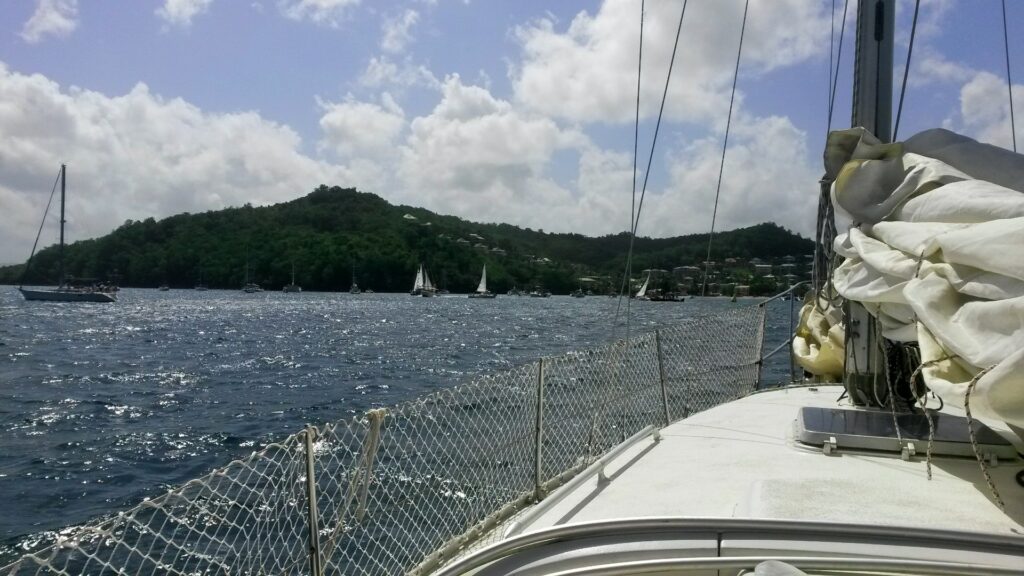
It was a windy day – 30kts in general and 40kts in the gusts, Moustache informed us later. Before we started we’d already watched another competitor dis-masted and other boats out in the bay heeling so much they were practically horizontal. We rigged a storm jib and put in two reefs. M. Escalade, who came to see us off, was scornful but we didn’t care. I don’t know about our teenage crew, but for myself and Jeanne this was the first time either of us had done anything like this. She’d wanted me to skipper, but it was her boat so I refused. We were nervous but fairly cheery. It wasn’t like we wanted to win or anything. Just to finish would be nice. If we were last, there was a free carenage as prize (bottom-scraping) and Païe Olive really needed it.
We started off pretty well, coping with the squalls and tacking a million times before getting round the first marker. This was great. We were learning lots. Go girl team! Other boats whizzed past us and we waved, because we couldn’t believe we were even taking part. As other boats began to lap us and our speed started dropping to 2kts, we started to lose enthusiasm. We’d had our sandwiches and the afternoon was drawing on. We were tired and still nowhere near the finish. We debated long and hard about what to do. We’d got to the far end of the course and wondered if anyone would notice if we went towards the marker but not actually around it. There was no-one here. Then we realised we needed to do another loop of the whole thing and it was nearly 5pm. With sunset at 6, this was going to turn into torture. It would have been nice to finish, but it wasn’t essential. Moustache had already called to find out where we were. If we didn’t come back now we wouldn’t even make the prize ceremony and dinner. We called up the race committee on the VHF to report in and say we were headed for the finish. They didn’t ask us if we’d actually finished the course, so we didn’t mention it. When we arrived M. Escalade came out to meet us in a dinghy. The race wasn’t over until one person had swum ashore and downed a beer, however. Since Jeanne needed to stay on board to skipper, and the teenager was underage, I dived in and swam the last stretch. I’d say ‘to cheering’, but there was hardly anyone there. The race committee ticked us off the list and gave me my beer. Our time wouldn’t be recorded until I’d finished it. Sailors, eh?
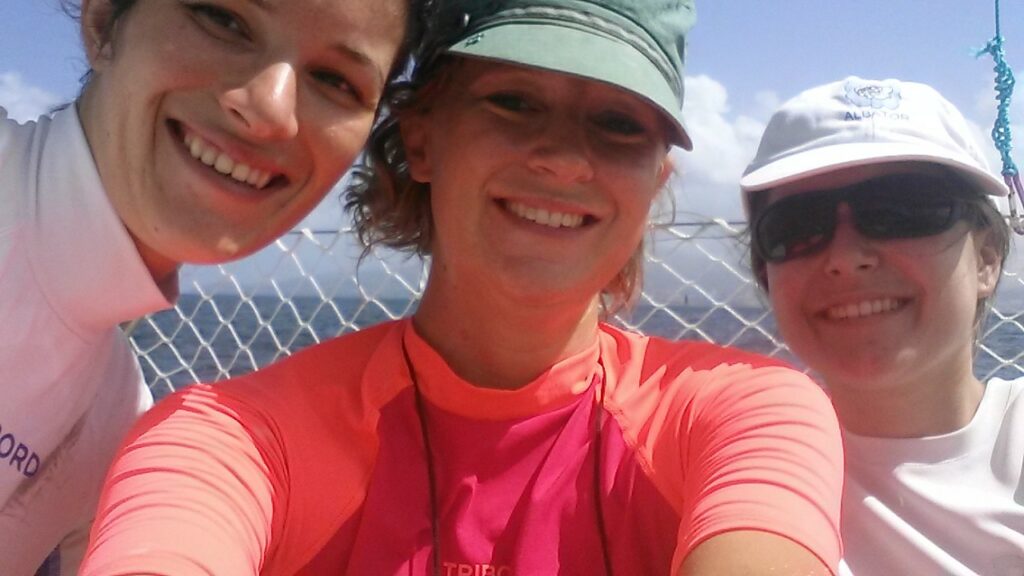
Boats from all over the island were competing in this regatta – it was one of the biggest of the year, and as a novice team of 3 girls and a cat, we were extremely proud of ourselves for having taken part. Myself and the captain had never raced before, and were still at the stage of working out how to use our sails without capsizing. Annoyingly, we didn’t even come last because someone even slower than us had actually bothered to finish the race, but we got a goody bag of prizes anyway and though it probably technically wasn’t ours, we felt we deserved it. For me it was a revelation to be on someone else’s boat as the most experienced sailor, and for Jeanne it was a freedom to take the command without her boyfriend pushing her around and undermining her confidence. Our teenage crew ran off to join a bunch of the kids I’d just been teaching and who were too embarrassed to speak to me, so we didn’t hear her side of things. I didn’t ask the cat how she felt. I don’t think she was that into sailing and we had a battle to keep her from hiding in the engine compartment.
At long last, I left the Archaeologist installed in my boat and returned to Europe to do some more sailing training that I hoped would give me the skills to run from a hurricane, if we had a repeat of last year’s disastrous summer (assuming I could get that pesky repair done, of course). Maybe when I came back I might be able to start my pilgrimage to Antigua, finally. If I came back. That was the big fear of the moment because last time I’d made it back across the pond, I hadn’t wanted to return. When you’re in Europe enjoying city life and old friends, Martinique seems like a dream. That was why I had my silly sailor stamp tattooed on my wrist: to remind me that I had another life, and not to get sucked in by the comfort of home (also, I’d crossed the Atlantic). Life on the boat in the Caribbean may be hard (honestly!), but I wasn’t ready to give it up. I just needed to remember that.



